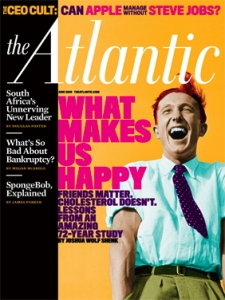 It’s hard to make South African president Jacob Zuma seem an attractive figure, and the profile of him here doesn’t try. What intrigued me was its description of an art Zuma has mastered, Zulu stick fighting:
It’s hard to make South African president Jacob Zuma seem an attractive figure, and the profile of him here doesn’t try. What intrigued me was its description of an art Zuma has mastered, Zulu stick fighting:
During my November 2007 visit to his homestead, I spoke with one of his brothers, Mike. As we stood by an enclosure where an ox had been slaughtered earlier in the day, Mike told me that his brother was clever, and should never be counted out. He said that from an early age, Zuma had been a masterful practitioner of traditional Zulu stick fighting. His distinctive technique had been to forego the formalities and hold his stick casually, as if he was on a lark. He’d turn away from his opponent, crack a joke, and smile. When it was least expected, he would sweep the other boy off his feet. Stick fighting is essentially a test of balance, not brute strength, in which one turns an adversary’s lunging attacks back on him.
That sounds like a martial art anyone with the makings of a successful politician would be well suited to practice.
An article called “Do CEOs Matter?” describes the classification of corporate leaders into two major categories, “Unconstrained Managers” and Titular Figureheads.” The men who coined these phrases were Professors Donald Hambrick and Sydney Finkelstein. In the article where they introduced the dichotomy, Hambrick and Finkelstein wrote that “If we had to choose as a society between doing away with Figureheads or Unconstrained Managers, clearly it is the Figureheads we would keep.”
Wayne Curtis praises the Kold-Draft ice maker, which can make the right kind of ice for particular cocktails. I myself don’t take ice with any drink, and for that matter I barely touch alcohol. But Curtis certainly does an excellent job of bringing out the Kold-Draft’s good points.
Pamela Paul reports on efforts to train dogs to track bedbugs.
Trevor Corson lived in Japan for a long time. Drawing on that experience, he explains what sushi is really like. It isn’t much like what you get in the USA. Not only is the food not the same, but to Japanese the idea of sushi is largely about a particular social experience. Regular customers gather around a counter, banter with the chef, the chef persuades them to try whatever it is he has prepared. There are no waiters, and there is certainly no such thing as prepackaged sushi you pick up off the supermarket shelf. It pleases Corson that some Americans are trying to bring sushi, the food and the social experience, to this country.
No comments:
Post a Comment